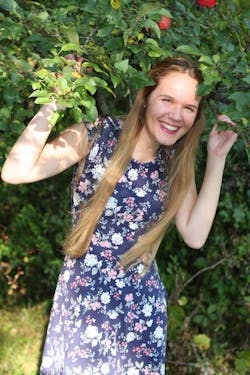2018 WWEMA/WWD Scholarship Recipient
Sara Myers is associate editor for WWD. Myers can be reached at [email protected] or 847.391.1007.
undefinedEvery year, Water & Wastes Digest supports future water and wastewater professionals by awarding $1,000 to a student seeking a career in the water and/or wastewater field through the WWEMA/WWD Scholarship. This year’s winner is Elena Smith. Smith is currently a freshman studying chemical engineering at the University of Wisconsin-Madison. Smith’s father works at Aqua-Aerobic Systems, a WWEMA member company.
Water & Wastes Digest Associate Editor Sara Myers spoke to Smith on what made her want to apply for the scholarship, her studies, and more.
Sara Myers: What made you apply for the scholarship?
Elena Smith: My dad works for one of the companies associated with the scholarship. I got an email from him the other day and I mean college isn’t cheap so I take every opportunity I can get to help fund that. Especially when it’s engineering related because then it makes me feel really supported.
Myers: What made you major in chemical engineering?
Smith: Um, it was about my sophomore year of high school I think I knew because I took "gen chem" [general chemistry] that year and I really enjoyed it. I already enjoyed math and I kind of knew I wanted to do engineering but taking chemistry that year kind of helped me turn towards chemical specifically.
Myers: Why did you decide to attend University of Wisconsin-Madison? Was there anything specific that made you choose that school? Was it their engineering program?
Smith: Yeah, it’s one of the best programs in the country for chemical engineering and it was really close to home so I could get in-state tuition. My dad went there for mechanical engineering and I’d had cousins who went there. I just really love the campus. I really love all the people here and it’s just really fun.
Myers: Was there a particular moment or event in your life that made you more environmentally conscience?
Smith: When I first started high school I was looking for a club to do and one of my friends brought me along to environmental club because her older sister was in it. I gradually became involved there. I saw that we can make a difference, even the little things add up. It became a lot more important to me to reach out to people and get more involved with the club and it was a lot of fun too. I made good friends there. We got a lot done that really helped.
Myers: In your essay you described bringing your own utensils to food places instead of using the plastic straws and such provided. What made you decide to do that?
Smith: I saw one of my friends eating with wooden utensils and I asked her about that. She explained, “I bought these cause they come in this cute little travel set made from recycled materials and they don’t absorb the taste. They are pretty easy to clean and you can just clip them on backpack. So, that way when you go out to eat, you don’t have to use plastic utensils and such.” She has a spoon, knife, fork and chopsticks, and I thought, “this is pretty cool.” I looked online to see how much it cost and it really wasn’t bad at all. Especially considering the impact this could make and telling people about it and encouraging more people. I wanted to support that brand too because they are doing a lot more to help and they donate some of their profits as well. It seemed like a good decision to make.
Myers: Can you talk briefly about the different groups or organizations you’ve been in that have influenced you to be more environmentally conscience? In both high school and college?
Smith: I did environmental club and through 4-H we did some road cleanups. So far in college, not so much. I’ve gone to the succulent club meeting where they talk about planting and propagation, encouraging greener habits. Otherwise, I know they have their own environmental club but I haven’t found a meeting yet. But, I’m looking more. I really want to get involved.
Myers: Any future career goals or plans? What type of organization would you like to work for?
Smith: I don’t have a particular organization in mind but I know I want to something with consulting individual plants to make sure each place that I work with is being environmentally friendly. I think with consulting than I can reach as many places as I can and maybe travel around the country or around the world to work to make that a reality.
A video interview with Smith at Aqua-Aerobic Systems can be found here.
